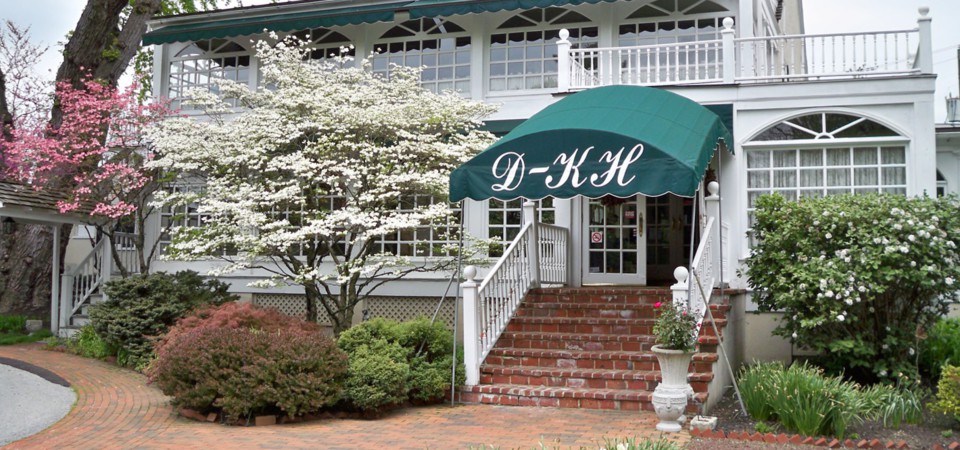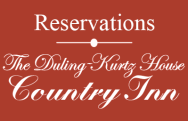
HISTORY
A B O U T T H E I N N
The Duling-Kurtz House and Country Inn is named for Edith Duling Carr and Lena Kurtz Knauer, mothers of Raymond H.
Carr and David J. Knauer, founders of this establishment.
Edith Duling Carr's ancestors settled in the area of Northeast, Maryland, where they eventually accumulated twelve river farms. Following the Civil War, the family lost control of the farms and moved
to Newark, Delaware, where "Aunt Edith" was born and raised on a farm. She was the youngest of seven children. As a young woman she drove her horse and wagon to Market Street in Wilmington where she
sold live chickens, eggs, and vegetables in the open market square. She married Robert H. Carr, who left farming to establish a regional milk transporting company in Frazer, and raised a family of
five boys and one girl. "Aunt Edith" resided in Chester County for the most of her 85 years.
Lena E. Kurtz Knauer, one of eight children born to a miller's family, was raised in the Morgantown, Pennsylvania area. During her youth, while homesteading in North Dakota with her sister, she rode
horseback through the West selling cosmetics to Indians. Her musical talents were recognized at an early age. She played piano for silent movies and as a performer became an accomplished
elocutionist. In her twilight years "Aunt Lena" entertained visitors regularly at St. Peter's Village with her musical saw and made several appearances on national television, playing her unique
instrument. "Aunt Lena" married Guy Knauer, an attorney in West Chester and raised a family of one son and one daughter. She was, in fact, a very colorful citizen of Chester County where she lived
most of her 90 years.
Duling-Kurtz House and Country Inn is named in honor of these two fine ladies whose love, strength and character deeply touched and wonderfully influenced so many lives.
H I S T O R Y O F T H E H O U S E
The rich history of Chester County surrounds you at the Duling-Kurtz House and Country Inn. This land was part of an original land grant
from William Penn to Richard Thomas who traveled with Penn to America in 1683. Thomas died shortly after arriving in the new land and his son, Richard, later claimed nearly 2000 acres of the
land grant in the Great Valley. In 1712, Richard and his wife Grace became the first settlers in what is now West Whiteland Township.
The land was rich and fertile for farming and through the years it was parceled and sold to prosperous gentlemen farmers. In the 1830's however, limestone and marble were discovered and mining became
an important business of the area. The Duling-Kurtz House and Country Inn sits on a tract of land which, in the 1830's included a grist and saw mill, mill pond and race, log tenement, two lime kilns
and limestone quarries. The old stone house, now our lovely Country Inn, was the primary dwelling for the owners of what was considered a most successful local industrial complex of the day.
Early records show that the land was owned for a time by James Hance who established water rights to the Valley Creek and by 1817 had erected a saw mill and grist mill. Hance's son Richard built the
house on the property by 1830. The death of James Hance and his son in the early 1830's left the property to be sold at sheriff's sale. It was purchased by George Hoopes in 1832 for $3,705!
Hoopes built and maintained a prosperous business. He worked at the quarries and the mills selling products of wheat and rye flour, buckwheat, cornmeal, and horse feed. The location of the property
being near the Valley Creak and Lancaster Turnpike (now Lincoln Highway), and Chester Valley and Pennsylvania railroads enhanced its importance for trade. In a newspaper notice of 1835, Hoopes
announced the sale of a variety of items including "... dried apples of an excellent quality, cheese, butter, buffalo ropes, timothy seed (and) good old manongohala rye whiskey which he will dispose
of on reasonable terms at his residence in West Whiteland Township." George Hoopes died in 1846 leaving his house, grist mill and saw mill to his son Robert who kept this important business active in
West Whiteland until 1885.
The Hoopes family is important and prominent in Chester County history. Notable family members are Robert Hoopes who helped to patent a car coupling for eleven cars in January 1874 and Thomas Hoopes
Jackson, ornithologist and photographer. Hubert H. Humphrey, senator and Vice President of the United States, was a Hoopes family descendant. Daniel and Jane Winslow Hoopes were the first of the
Hoopes family to settle in Chester County. Their second great grandson, Aaron Baker Register, was Vice President Humphrey's great grandfather.
When Robert Hoopes and his wife left the property in 1885 it was acquired by the locally prominent J. Preston Thomas, a seventh descendant of Richard and Grace Thomas, the original settlers of the
Whitford land. With J. Preston Thomas the land was again made part of the Whitford Farm, the land given to his ancestor by William Penn.
J. Preston Thomas returned the land to farming. His was described as "one of the most valuable and productive of the many fine farms in Chester Valley." Thomas was a man with a deep commitment of
public service as well. He was elected Director of the Poor in Chester County in 1887 and served as trustee to the West Chester State Normal School, Haverford College, the Epileptic Farm Colony in
Oakbourne and Rush Hospital for Consumptives. He served also as director and officer of many of the county's financial institutions
J. Preston's daughter, Martha Gibbons Thomas, cattle breeder, politician and suffragette was bequeathed the house in 1905. She was one of the most colorful individuals connected with the Duling-Kurtz
House history. Martha Thomas was described as "one of the best known women in Chester County and probably the most prominent in the many lines of activity .. (she had) achieved considerable
distinction in the State of Pennsylvania, and was widely known in political and philanthropic circles.
Martha Thomas was one of the first eight women elected ito the State House of Representatives in Pennsylvania in 1922 and re-elected in 1924. She was a breeder and authority on pure-bred guernsey
cattle "without peer in her county." Her farm was the first in the area to have a federally accredited herd of dairy cows!
Martha Gibbons Thomas was a member of the first graduating class of Bryn Mawr College in 1899 and returned there later to serve as a Warden of Pembroke East and member of the Board of Managers. She
shared her knowledge of farming and love for the countryside with her students who fondly recall Martha Thomas and the wonderful place that is now Duling-Kurtz House and Country Inn. "I see her at
weekends on her two hundred acre dairy farm at Whitford ... where we used to stroll to admire the purebred guernsey which had won many state prizes. I think of her old Pennsylvania stone house with
its thick walls, its handsome old furniture and above all, its restful silence."
In this luscious Chester County countryside, surrounded by history and memories of some colorful people who were part of it, we hope your visit to Duling-Kurtz House and Country Inn will create fine
memories for you.
T O D A Y
Duling-Kurtz House and Country Inn continues the tradition of providing the history, charm and hospitality for which Chester County
has become famous.
Michael and Gertie Person, proprietors, received their formal training in Vienna, Austria. Working in the finest of Europe's great restaurants and hotels, is your assurance of excellent service, and
superb food at affordable prices. Our Country Inn is known for its attractive and comfortable guest rooms, each with its own charm.
Michael and Gertie take pride in being part of the history that is Duling-Kurtz House and Country Inn, and extend to you an invitation to enjoy gracious dining and our warm hospitality in a unique
historical atmosphere.



